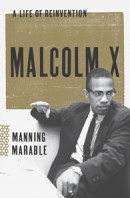 Marable spent more than a decade working on his revisionist biography of Malcolm X, and died three days before its publication, at the age of 60. David Remnick writes: “One of [Marable’s] goals was to grapple with Malcolm’s autobiography, and although he finds much to admire about Malcolm, he makes it clear that the book’s drama sometimes comes at the expense of fact. . . . Malcolm, like St. Augustine, embellished his sins in order to heighten the drama of his reform.”
Marable spent more than a decade working on his revisionist biography of Malcolm X, and died three days before its publication, at the age of 60. David Remnick writes: “One of [Marable’s] goals was to grapple with Malcolm’s autobiography, and although he finds much to admire about Malcolm, he makes it clear that the book’s drama sometimes comes at the expense of fact. . . . Malcolm, like St. Augustine, embellished his sins in order to heighten the drama of his reform.”
Adam Bradley says, “Perhaps the most significant departure that Marable’s biography offers from the Autobiography comes in the new trajectory it suggests for Malcolm’s life. Whereas the Autobiography spends nearly half of its 500 pages on Malcolm’s dissolute youth prior to his conversion to Islam and release from prison, Marable dispatches the hustling Malcolm in just under a hundred pages, dedicating the balance of his 500-page book to Malcolm as he would refashion himself as activist and organizer.”
This choice paid off, according to Wil Haygood: “The result is not just a biography, but also a history of Muslims in America and a sweeping account of one man’s transformation — and of the conspiracy, abetted by police inattention, that took his tumultuous life. The tension toward book’s end — when Malcolm was trying to figure out who might murder him — is so gripping it nearly soaks through the pages.”
Overall, the reviews have ranged from positive to raving: Geoff Dyer calls the book “completely riveting . . . it is inevitably much more than a biography of one man (Marable’s nice phrase is ‘the social architecture of an individual’s life’). Marable is intensely and intimately sympathetic, but he brings out Malcolm’s failings and repeated foolishnesses — personal, ideological, and tactical — within the rapid and headlong advances he made in life.” Peniel E. Joseph writes, “Stripped from the cocoon of his posthumous aura of invincibility, Malcolm X emerges from these pages an endlessly fascinating and protean figure whose shortcomings make his political accomplishments all the more remarkable.” Remnick says, “Although Manning Marable may not have succeeded in writing a definitive work, his considerable scholarship does remind us how much is elided by any tale of a pilgrim’s progress.” Haygood says, “It will be difficult for anyone to better this book. It goes deeper and richer than a mere homage to Malcolm X. It is a work of art, a feast that combines genres skillfully: biography, true-crime, political commentary.”
One dissenting voice caused a moment’s controversy: Karl Evanzz was enlisted to review Marable’s work for The Root, a Slate spin-off overseen by Henry Louis Gates, Jr., a friend of Marable’s. When the site killed the negative review, there was talk of a fixed game. But Evanzz posted the review on his site, so we could judge it for ourselves. (“Marable’s friends dare to call this his ‘magnum opus.’ To use street vernacular, this ain’t his magnum nothin’.”)
Malcolm X: A Life of Reinvention by Manning Marable
Viking, 608 pp., $30.00

